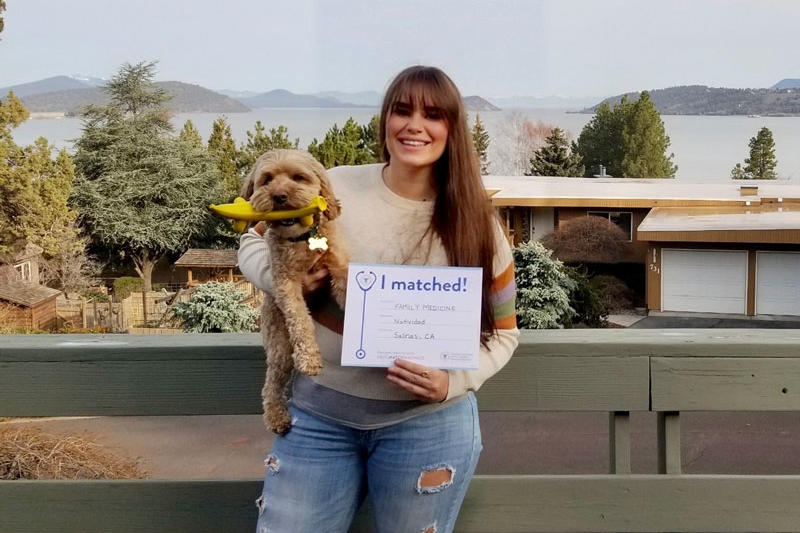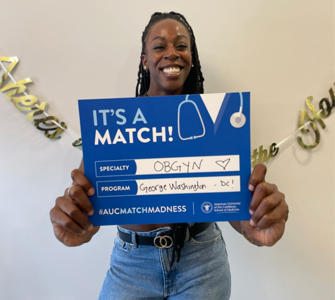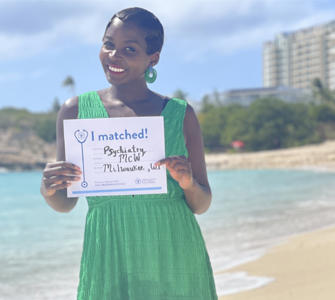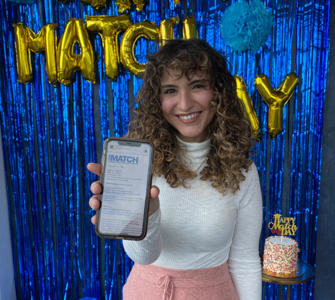For Alexandra Arnold, MD, a career in family medicine checks all the boxes.
The first generation four-year-university graduate and self-described, people person is not only looking forward to the many career opportunities that are available to a family practitioner, but she is also excited for the continuity of building relationships with her patients. “It’s nice when you get to know somebody and you can celebrate their successes, but also be their support when they are faced with a challenge, and they know they have you to trust,” she says.
The decision to choose family medicine was one that Dr. Arnold weighed heavily against her second close option, surgery. “I had an interest in everything. I love surgery a lot, but I didn’t necessarily see myself in it,” she says.
Ultimately, she, like many American University of the Caribbean School of Medicine (AUC) graduates, decided the best fit was in family medicine. In June, she will begin her post-graduate training at Natividad Hospital in Salinas, California, as one of more than 85 AUC graduates starting family medicine residency programs this summer.
“I know this is where I can be of most help and as a country, we need really great family practitioners. They are the first person patients get to know and they can provide the most preventative care in order to be of most use,” says Dr. Arnold.
Planting the Seeds of Interest in Family Medicine
While working as a medical scribe for, a family practitioner prior to medical school, Dr. Arnold was able to see the true impact she could have on the patient experience. She witnessed first-hand the relationships built with patients and how the physician really got to know them. Scribing played a huge role in her choice to pursue family medicine.
Dr. Arnold says, “He was fantastic and had a great perspective of management of quality over quantity. He was the first doctor I saw who really got to know his patients. He was a great mentor to me. He really pushed for me to keep applying and pursue medicine.”
After that, she applied to AUC and was accepted. From there on out, it was Dr. Arnold’s drive and passion for medicine, along with the help of her great professors and classmates, that helped her succeed.
“I got a fantastic education at AUC. The professors were amazing. Some of the alumni who had some time before starting residency would come back as fellows and teach clinical courses, and they were a wealth of knowledge,” she says. “Whether upper classmen or alumni, everyone from AUC is so willing to help you and give advice.”
Building a Solid Med School Experience
During her time at AUC, Dr. Arnold made sure to take advantage of all the opportunities available to her. She became involved in the St. Maarten Aids Foundation, where she assisted with free HIV testing and became an aids ambassador in the US to work with legislation and create medical tool kits for schools across the country. She credits AUC with providing many student opportunities to participate in organizations and activities, to continue to build your resume and assist with the match process in the future.
She completed all of her clinicals at Ascension Providence Hospital in Michigan and spent a year and a half there. “It was a really good experience and it’s a teaching hospital, so you get to work with residents all the time.” According to Dr. Arnold, one thing that really stood out to her was the positive recognition the attendings gave the AUC students, for their eagerness and drive to learn.
Her advice for students entering med school: Work hard in your first two years of basic science classes. Dr. Arnold says, “I feel like because I did well on basic sciences and got a good score on the United States Medical Licensing Examination® Step 1 exam, clinicals were so much easier because I could focus on being present at my clinicals and in the moment. If you can buckle down and do really well in the first two years, that’s what really set me up for success.”
She acknowledges that the first few years of medical school can be pretty intense. Having lived most of her life close to her tight-knit family in Oregon, the move to Sint Maarten was a drastic change, and it was a challenge to be far from family and miss out on certain life events. “You kind of have to shut the world out if you want to succeed. It comes down to discipline and knowing it’s not forever. But you have to do it.” Meeting her best friend in medical school and also having a few years of life and work experience before entering the classroom, also helped her adapt well to the intense academic rigor of the first few years.
She also suggests jumping in to get the most out of every experience. She credits this mindset to being given opportunities to do a lot of procedures on her surgery rotation, and even delivering a baby on her own when the hospital she was at had three or four women in active labor, all at the same time.
Dr. Arnold is excited to be heading back to the West Coast for residency, where she can be close to the beautiful scenery in California. She hopes to prioritize her time off by being in nature as much as possible.





